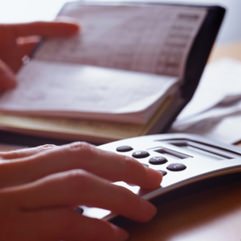 Most people struggle with money at some point in their lives. Whether it is with budgeting, managing debt or overspending, getting out of a bad financial situation can be extremely difficult. Your health may suffer as well, as financial difficulties are very stressful. To keeping your personal finances, check out these seven tips that will set you on the path to financial security.
Most people struggle with money at some point in their lives. Whether it is with budgeting, managing debt or overspending, getting out of a bad financial situation can be extremely difficult. Your health may suffer as well, as financial difficulties are very stressful. To keeping your personal finances, check out these seven tips that will set you on the path to financial security.
Seven Tips For Keeping Your Personal Finances
1. If you are paying interest on debt, try to pay more than the minimum payment each month. By paying just the minimum, it is estimated that ten thousand dollars worth of debt may take you up to thirty years to pay off! However, adding extra funds toward the principal balance will get your debt paid off more quickly. It is often said that by paying two extra mortgage payments per year, your thirty-year mortgage can be paid off in fifteen — and the interest savings are astronomical.
2. Be sure to balance your checkbook as soon as you get your monthly statement. It is easy to avoid doing this, but then you will never have a good idea of how much money is in your account. This can lead to money shortages for important bills and loan payments, and can also result in overdraft charges. By balancing your checkbook regularly, you can know exactly how much money you have and spend accordingly.
3. Keep track and remain aware of how much you owe on credit card balances, loans and other debt. By knowing how much you owe, you can keep your budget in check, as well as allot any extra money you have toward paying your balances off early. Pay a little more toward the higher-interest loans, and less for others. You will be amazed at how quickly your balances drop using this method.
4. Anyone wishing to have a healthy financial plan should open an emergency savings account. This is separate from regular savings and retirement plans. Instead of using credit to pay for emergencies, such as car repairs or a leaky roof, set up a direct deposit from your paycheck into your emergency fund. After a while, you shouldn’t even notice the deduction, and when emergency funds are needed, they will be available to you, interest-free!
5. Never borrow more than you can afford to pay back. If you need to borrow money to purchase a car or other large item, a sales person may tell you that you can afford the monthly payment, but this may not be the case. Instead, study your budget carefully, and if you cannot comfortably make the payment each month, you may need to put off the purchase until you can better afford it.
6. Try to avoid borrowing money from friends and family. Many a family feud has begun over money. Many people take a loan from a close family member or friend for granted, and put paying it back on the back burner. If you do borrow, keep good communication, letting the person know if you are having trouble paying the money back, and working out a solution that satisfies both parties. Money issues are not worth losing relationships over.
7. Create a workable budget, and stick to it faithfully. Following a budget is vital to your financial health. You will always know how much you owe, and how much you have left over each month for spending and savings. Also, be sure to budget money to add to your emergency savings. People who budget their money have far fewer money issues.
Everyone wants to live a worry-free financial life. It’s not always easy, but it is possible with a little extra time and effort. Try these seven tips for keeping your personal finances, and see how much healthier your finances are within just a few months. The benefits will be well worth it!
